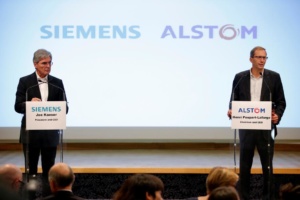Investors welcomed a merger of the rail businesses of Germany’s Siemens and France’s Alstom, billed as creating a European champion, but French unions and politicians said France was giving Germany control and risking jobs.

The tie-up, set to help the companies counter the rise of China’s state-owned CRRC 601776.SS, represents an industrial win for French President Emmanuel Macron, who is proposing sweeping reforms for Europe, including deeper trade cooperation.
French and German leaders have for years called for the creation of “European champions” such as Airbus to capitalize on the strengths of Europe’s single market and create the scale needed to compete with U.S. and Asian rivals. Yet talks have often stumbled as politicians seek to protect jobs and retain national influence over an industrial sector.
But this may be changing. In another sign of France’s willingness to make concessions on the ownership of strategic interests, an Italian government source said shipbuilder Fincantieri was poised to take effective control of shipyard group STX France, ending a lengthy dispute.
On the railway deal, France’s finance ministry said it had secured a commitment from Siemens to safeguard Alstom’s French manufacturing plants and jobs for a four-year period after the deal closes. A German trade union said they had got the same guarantees.
But unions in France accused the government of neglecting strategic interests. “It is bound to bring a restructuring and no doubt the culling of hundreds of jobs,” said Olivier Kohler, a trade union official in the eastern French town of Belfort, where Alstom makes the high-speed TGV trains.
Pascal Novelin, a CGT unionist said: “Transport in France is a strategic asset and they’re selling it off. No industry is safe.”
Under the deal, Siemens will have a small majority of the Paris-based and listed combination, which promises eventual annual cost savings of 470 million euros ($552 million) a year, while Alstom boss Henri Poupart-Lafarge will become its CEO.
While Joe Kaeser, CEO of Siemens, acknowledged there would be job losses, he said they would be in support functions such as human resources rather than in engineering.
“Of course there will be redundancies, that’s part of the synergies,” told a news conference. Alstom shares jumped as much as 8.5 percent and Siemens rose 2 percent as analysts focused on the cost savings. They closed up 4.2 and 1.2 percent respectively.
Henri Poupart-Lafarge, Chairman and Chief Executive Officer of Alstom, attends a news conference with Siemens CEO to announce their deal to merge their rail operations, creating a European champion, in Paris.
“What makes this deal attractive are the targeted cost synergies,” wrote Barclays analyst James Stettler, who rates Alstom “overweight” and Siemens “neutral”. But Deutsche Bank analysts said the targeted annual synergies looked “overly ambitious”. They estimated 230 million euros of synergies and said the economies of scale in train production were not significant and that politicians would try to protect jobs in France and Germany.
Deutsche Bank kept a “hold” rating on Alstom shares.
The deal sidelines Canadian transportation group Bombardier Inc. which also held talks with Siemens, sources have said.
Bombardier said it was always open to “strategic options” but also said: “We do not need to merge with another major player to maintain our leadership position in the rail business.”
Siemens will control Siemens Alstom, with 50 percent of the combination plus a few symbolic shares. It will also get warrants allowing it to eventually acquire another 2 percent.
Alstom’s shareholders, meanwhile, are set to receive two special dividends from the tie-up. The Siemens and Alstom transport businesses have combined sales of 15.3 billion euros and earnings before interest and tax of 1.2 billion euros, raising questions over whether the deal could fall foul of European anti-trust regulations.
But Alstom’s Poupart-Lafarge said the two had done their homework, adding he was confident of finding a solution.
“Of course this is a large deal so no surprise it will be looked quite closely by the European Commission,” he said.
BNP Paribas SA and Goldman Sachs advised Siemens, while Rothschild and JPMorgan Chase & Co advised Alstom on the deal.
Kindly follow us on twitter:@AfricanVoice2












